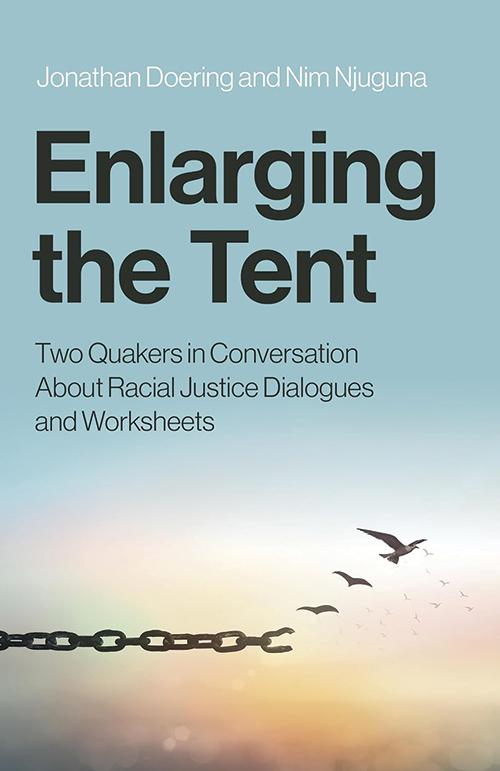
Enlarging the Tent: Two Quakers in Conversation About Racial Justice (Dialogues and Worksheets)
Reviewed by Patience A. Schenck
February 1, 2024
By Jonathan Doering and Nim Njuguna. Christian Alternative Books, 2023. 192 pages. $17.95/paperback; $8.99/eBook.
Have you ever enjoyed eavesdropping on an interesting conversation? That is what reading this book is like. The book is the transcript of a series of discussions between two Quaker men on the topic of racial justice.
Jonathan Doering, a White British writer, teacher, community organizer, and freelance journalist, approached Nim Njuguna about an interview. Njuguna suggested, instead, that they interview one another. Njuguna is a Black Kenyan who was living in England. He is a former Baptist minister who later attended Johannesburg Meeting in South Africa (he is now a member of Harrow Meeting, part of Britain Yearly Meeting). He is a therapist and spiritual director who in 2023 served with his wife as a Friend-in-Residence at Pendle Hill study center in Wallingford, Pa.
Both men acknowledge that to really confront racism is to constantly examine oneself. They comment that social justice is more than what we do, it’s about who we are, who we are becoming.
“Holisticity” is a central theme of the conversations: the idea that becoming effective antiracists requires constant growth and integration of one’s spiritual, psychological, and activist selves. As we recognize whatever privilege we have because of our skin color, gender, economic standing, or other characteristics, we need to deal with any sense of guilt we may feel. We need to avoid blaming or shaming those who are slow to acknowledge racist realities. We have to be willing to listen to others, to hear their stories. All this raises a variety of feelings that must be dealt with, a process that takes some time. In addition, we need to internalize the understanding that there is that of God in each of us, the spiritual basis of work for justice. And always, we must act. We need to find ways to actively counter racism that use our best gifts and passions.
These psychological, spiritual, and activist steps are not simply sequential: we don’t complete one and go on to the next. Rather, we cycle back to earlier stages over and over as we gain new experiences and insights.
The two explore many aspects of antiracism. One is alliance with the people directly oppressed by racism: How do we do it effectively? How do we connect with White people in denial? How do we work for diversity and inclusion among Friends without inflicting guilt or shame, which often hardens denial?
How do we gain intellectual knowledge about racism without neglecting to continually examine our own attitudes and the assumptions we grew up with? We need to recognize how culture and the media reinforce certain beliefs, attitudes, and societal forces; how they are hard-wired to reinforce privilege; and how blind we can be to these factors. And how do we become comfortable with being uncomfortable? As Doering comments, antiracism is not an event; it is a lifestyle change. It’s the work of a lifetime.
The book ends with a series of worksheets that could be used as the basis of a workshop series. The worksheets challenge participants to examine their own knowledge, feelings, and attitudes, and then note one new thing each session that they have learned and commit to one action they will take.
I found the two discussants to be brilliant. They deserved better editing than they received. In the edition I reviewed, the book’s subtitle is lacking punctuation that would provide better clarity, a rather gross oversight. I searched in vain for the two men’s bios to better understand who they were. Then, as I finished reading the book, I found them under the title “Worksheets,” without any heading to identify their biographies. I also found confusing the speakers’ use of the acronym BAME for Black, Asian, and minority ethnic, and their providing no explanation for the non-British reader, which sent me to Google.
That said, I found these dialogues to be rich, challenging, and quite wonderful.
Patience A. Schenck is a member of Annapolis (Md.) Meeting living at Friends House in Sandy Spring, Md. She is the author of the Pendle Hill pamphlet Living Our Testimony on Equality: A White Friend’s Experience.



Comments on Friendsjournal.org may be used in the Forum of the print magazine and may be edited for length and clarity.